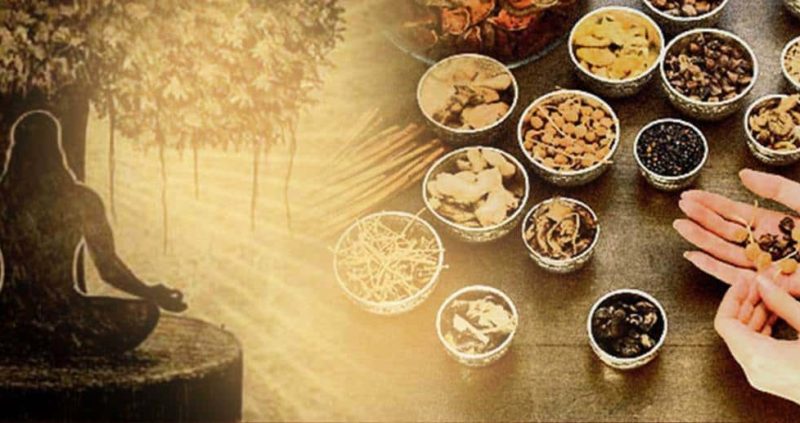Ayurveda classifies a human into two types. First is the body and the second is the mind.
Have you ever thought about how your state of mind affects your health? Ayurveda suggests that your mind has a potential influence on your overall health and well-being.
All the Ayurvedic approaches to treat any aspect of health takes into account your body, mind, and spirit. It is because an imbalance in any of the three aspects can negatively impact your health and well-being.
In this article, we are going to discuss the most important aspect of your health which is often neglected, “The Mind”.
Ayurveda has many tools to clear your mind of any kind of disturbances, give you mental clarity, rejuvenate your mental capacity, and fine-tune your mind.
So, let’s get started with the Ayurvedic approach towards mental qualities of an individual.
Ayurvedic Concept Of Mental Constitution
Ayurveda suggests the energy in your body moves via the different body channels. These channels are referred to as Srotamsi in Ayurveda.
The prime channel in your body in the Ayurvedic tradition is the channel of the mind. It is known as Mano Vaha Srotas.
The Channel of Mind plays a vital role in overall health and well-being. Before moving into the Ayurvedic particulars ask yourself where is the mind in your body residing? Probably, your answer is the brain inside your cranium.
But, in no way, Ayurveda has confined your mind location to the brain only. Instead, the ayurvedic culture has taken the channel of mind broadly.
It suggests the mind is what you are, how you behave, how you act, and how is your body. Now, let’s move forward to the bigger picture of your mind origination.
Origination Of The Channel Of Mind
Ayurvedic culture says the root channel of your mind is not your brain but your heart. So, for knowing your mental constitution you have to get out of your heads out step into your hearts.
The Vedic science considers Heart as the energy hub of your body. They define heart as the root of physical and energetic pathways in the body.
It is connected to every minute body tissues and cell via three different channels. No other body organ has this level of integration in your body.
Your heart center is the chair of emotion, purest form of self, and of course the love you have for others. So, Ayurveda asks you to fundamentally view the mind as a whole instead of just restricting it in your brain.
The mind is affected by every cells and tissue in your body. Thus, there exists a direct relationship between the mind and the over health.
If your mind is imbalanced your body cell and tissues would be imbalanced and would eventually imbalance your physical health.
Openings Of Channels Of Mind
The channels of mind have multiple openings that open up in the exterior of your body. These openings strategically balance the state of mind.
The first opening of the mind are the five sense organs (eyes, nose, tongue, skin, and ears). The mind receives the sensory inputs on a daily basis.
Regardless, of what kind of sense (negative or positive) you experience daily, your mind tends to align with the qualities of your daily sensory experience.
For example, if you are exposed to a lot of stress, your body system would develop an association with the energies of stress and begin to predict its reoccurrence.
This would eventually bring a negative feeling or fear in your mind and body and eventually affect your health in a negative way.
Same way if you expose yourself daily to love, healthy relationships and mindfulness of other, your sensory organs will be filled with the energy of love.
However, the degree of sensory emotions and its relation with the channel of mind varies from person to person. For example, a news about a natural calamity may dishearten someone to the core and for some, it might be normal.
The perceptions of different sensory organs and its reaction are thus related to your channel of mind. To get a better overall well-being we have to balance our channel of mind too. Ayurveda stresses you to balance your channel of mind along with the doshas to keep your self-healthy.
Now, let’s move on to the bigger picture and see what are the type of channels of mind prevalent in the society i.e. the types of personality and mental qualities you possess.
In Ayurveda, your personality is of two types— one is Physiological, and another is Psychological.
The physical features of your body are classified based on Dosha body types (Prakriti) and thus they fall under the Physiological classification.
In the same manner, Ayurveda has classified your mental functions into three personalities knowns as Gunas and thus they fall under the Psychological classification.
These fundamental gunas are the prime elements responsible for your emotions, mental well-being.
In Ayurveda, there are three types of mental qualities of an individual—Tamas, Rajas, and Sattva.
- Sattva is the potential energy. Presence of sattva helps you stay conscious.
- Rajas are the kinetic energy. It makes your thoughts, emotions and feeling creative.
- Tamas is the inertia. And without tamas, there is no sleep.
Out of these, you dominate some specific qualities of one guna. And the same guna affects your perception, social relations, communications and physical activities.
The three qualities are not separate— they are just different sides of a single energy and are equally important for your body.
In fact, if these three qualities are not balanced together, it will break the rhythm of your living.
You can find nature of your mental constituents by using this simple Ayurveda Mental Constitunets Application.
The Qualitative Nature Of Gunas And Their Functions
As you know your mental constitution has three Gunas and so is your personality. An individual personality is off three types— tamas, rajasic and sattvic. So, let’s go forward about all the three in detail.
Tamas: Inertia, Dullness
It is the mode of rest, inactivity & idleness. It alerts you to take rest when you are tired of an intense workout.
And when Tamas is too much in quantity, it leads to a lack of intelligence. You are often depressed, lazy, sleepy even in daytime. You become exhausted with little mental activity.
Using your senses, you look for temporary satisfaction. Mostly you like to eat, drink, sleep and have sex. You turn greedy, possessive and apathetic towards others.
You don’t bother to blame or harm others for your self-profits. Being depressed you go anxious. And often crave for short-term reliefs like alcohol, sedatives, and other additives.
Your food habits often include liquor, animal products, meets, over processed and frozen recipes.
Rajas: Stimulated, Cravings
Rajas are state of calmness, excitement & active. All your movement and activity happen due to rajas. So, you find sensual enjoyment, pleasure, and pain, effort and restlessness when rajasic.
When excessive in rajasic qualities you are loving, calm and patient until the moment one serves your self-interests. You are self-centered, egoistic — friendly and loyal towards those who fulfill these desires.
For example:
When you grow into an adult, in your classes or playgrounds you feel passionate about some particular activities. But when you find someone better than your level, you compare yourself with them. You go egoistic. Aggressive.
You compete and work hard to become a perfectionist. Power, prestige and want the control of others in your hand is your thinking but may lack in proper planning and direction.
You are more likely to maintain the same pattern throughout the life and tend to sleep for eight-hours and suffer from fear of failure.
In fact, most us are living in this state—the world of rajas. Seeking satisfaction from external sources—through our senses.
Sattva: At Peace, Free From Attachments
Sattva is the mode of reality, purity, spiritual consciousness, and clarity in perception. It promotes happiness, joy and makes you free from materialism.
When sattvic qualities are dominant, you are religious, pure-minded and become a truth-seeker. Your follow good manners, behave affectionately and do not get angry quickly.
Even if you work efficiently, your mind does not get tired. And need a night of sleep more than four-five at night only.
Your looks become vibrant, fresh and attractive. It happens due to the expansion of wisdom, happiness, and joy.
Emotionally you are humble, creative and respectful to others. You are caring for every life and existence— birds, trees, animals.
You cherish every moment you live—with full of energy. Yogis, saints, and monks are sattvic practitioners.
You can elevate your conscience to Sattvik by following simple Sattivk food to your diet and doing yoga.
Mind And The Three Doshas
Moving forward to find the interrelation of doshas and mind. As mind and body are interrelated so there the mind also influences the balance of the doshas.
An imbalance in the mind causes an imbalance in the Doshas. The Vata, Pitta, and Kapha influences the mind, emotions, and consciousness and thus the overall health. Let’s get a deeper understanding of the same.
Vata And The Mind
The Vata dosha controls your nervous system and the mind. Your Vata doshas and your mind both are made from air and ether elements.
So, when your Vata is balanced, your mind feels creative, strong intuition, spiritual understanding, ability to expand, and clear thoughts.
An imbalance in the Vata can cause instability in mind, agitation, hypersensitive or too many emotions, and make you get into excessive Rajas.
It can also make rapid mood changes, fear, scattered self, demotivation, ungroundedness, too many thoughts, over the active nervous system, and a sense of loneliness.
When Vata in your body is excessively high you can feel disassociated with the world, you feel insecure about your relations and the materialistic things.
The imbalances of the Vata dosha in relation to mind are a result of overexertion, prolonged working hours, stress, multiple works, travel, loud music, exposure to nicotine, caffeine drugs, over-exercising, lust and over the use of technology.
You can also elevate your vata in the mind by a Vata-provoking diet. Such a diet has too many light and dry foods like raw vegetables, dried fruits, and crackers.
Pitta And The Mind
This dosha governs your insight and intellect. The Pitta is related to the gray matter in your brain and thus has a whole lot of connection with the mind.
A balanced Pitta affects your mind with positive qualities like courage, confidence, intelligence, willpower, leadership, a futuristic vision, acceptance, satisfaction, enthusiasm, cooperation, and the ability to surrender oneself
An imbalance of Pitta dosha in your body can align a lot of Rajasic qualities in your body. The imbalance will take you towards negative emotions like anger, hatred, frustration, impatience, envy, judgemental, criticism, over-ambitious, irritability, and a negative desire for power.
You end up aggravating your Pitta and your mind by eating excessive heat, upward moving energy in the body, liver imbalances, over the extended period of focus, and by disregarding the needs of the body.
Moreover, Pitta and the Rajas is also increased by a Pitta-provoking diet that is too hot, spicy, oily, and contains a lot of fried and junked food.
Kapha And The Mind
The Kapha dosha governs the lubrication in your body. This dosha is related to the white matter in the brain, the adipose tissues, and the nervous system. It is also strongly connected to your memory.
When the Kapha dosha is balanced in your body you will have positive feelings like love, patience, groundedness, loyalty, compassion, endurance, patience, and sharp senses.
Kapha dosha is aligned with the Tamas mental constitution. An imbalance in it causes the tamas quality to build up in your mind.
An imbalanced Kapha dosha tends to make you lazy, lethargic, depressed, stubborn, greedy, emotionally possessive, and increase the desire towards materialistic things.
This kind of aggravation of Kapha and mind is caused by heaviness in the physical, mental, and emotional spheres and also a result of downward moving energy in the body.
A sedentary lifestyle including inadequate physical activity, heavy food, cold food, and lack of interest towards life can result in such imbalances.




